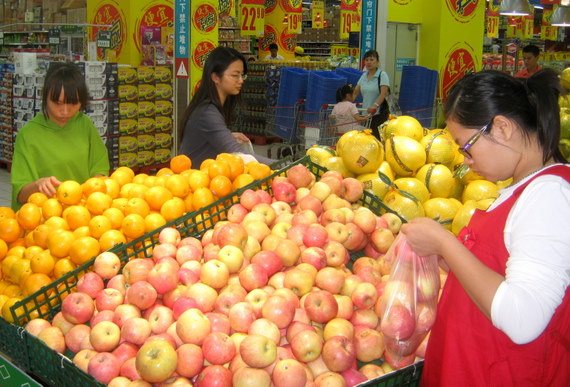
I'VE CALLED SHENZHEN home now for over two years yet am still trying to make sense of prices here.
Taxis here are the most expensive in China at 2.04 usd, but still miles behind Tokyo where rides begin at 9.34 usd.
Meanwhile, a ticket to get into Shenzhen's Happy Valley theme park is a sky-high 180 yuan, just 20 yuan shy of the monthly salary of a bus driver in the northern city of Shenyang!
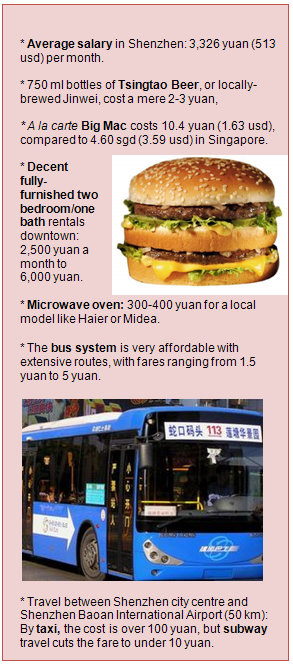
This city which has blossomed on the border with neighboring Hong Kong is both China's highest salaried and one of its newest metropolises.
It is also the country's most crowded city, yet on major holidays it becomes a virtual ghost town, as the vast majority of denizens hail from other provinces.
Its urban population density is a stifling 8,588 persons per square kilometer compared to 7,315 in Singapore, and its population is over 13 million (i.e. two-and-a-half Singapores).
It is hard to find a person among Shenzhen's millions who is content to struggle through life here on minimum wage.
Most of the people I meet, especially those who were born elsewhere, are obsessed to varying degrees with making it big.
So how deep do one's pockets need to be to live a reasonably comfortable life in China’s most expensive city?
The average salary in Shenzhen increased to 3,326 yuan (513 usd) per month last year, a 4% year-on-year increase and behind the rate of inflation.
The Shenzhen Municipal Human Resources and Social Security Bureau said in the survey that average high-end monthly salaries in the city recently edged up 0.4% year-on-year to 25,389 yuan while medium-level take-home pay jumped 6.1% to just under 3,000 yuan.
Shenzheners fortunate enough to land jobs in the city’s high-flying finance industry had average high-end monthly salaries of 63,167 yuan, a figure which not only can hold a candle to neighboring Hong Kong, but also undoubtedly helps attract top talent from the Special Administrative Region to Shenzhen.
The fact that Shenzhen has one of China’s two stock markets (along with Shanghai) helps inflate incomes in the financial sector but also fuels some of the high-end property prices that some say have helped create a real estate bubble in the city.
Property
Those in the real estate industry will tell you their favorite customers are either arrogant or ignorant... or a combination of both.
During boom times, arrogant nouveau riche homebuyers are eager to display their newfound wealth with both urgency and ostentation. This makes them highly motivated buyers and they are very likely to overpay.

On the other hand, ignorant buyers (or renters) will not do the necessary homework to ensure they are not getting bamboozled, and will usually sign onto an overly-long contract at an unreasonable price simply because they are either too troubled to bargain, or too busy to shop around.
While these ground rules apply in any market worldwide, they seem to be especially important in Shenzhen because not only is the property bubble and pricing disparity so pronounced in this southern boomtown, but also because there is such a massive influx of naïve outsiders without the skill sets to secure a fair deal.
Therefore, unless you are a local, I would strongly suggest apartment hunters and especially home buyers employ the services of a trusted native friend to begin the negotiating process.
Anecdotally, when I first arrived, I would casually walk up to a real estate sales office and point to the basement-priced apartment unit advertised outside.
Inevitably, I would be told that units at that price were no longer available and perhaps I would like to live in a four bedroom flat with two bathrooms and a piano?
I was just looking for a one bedroom place and my piano skills are limited to playing chopsticks, so I was forced to look elsewhere.
But the moment I asked a local friend for help, things turned out very differently.
With me waiting in a nearby café, cell phone ready at hand, I was given regular updates on the progress my Chinese friend was making and actually ended up signing a rental contract lower than the advertised price.
I ended up living high-up in a relatively new 33-storey complex with a view of the rural New Territories of neighboring Hong Kong.
Generally speaking, assuming non-locals are not attempting the process alone, decent fully-furnished two bedroom/one bath rentals downtown can be gotten for as low as 2,500 yuan a month to 6,000 yuan.
But if renters demand the best, be prepared to shell out upwards of 20,000-30,000 yuan per month for the finest digs the city has to offer.
Food & Drink
The Economist came up with the Big Mac Index, using the popular McDonald’s double-decker burger as an informal means of determining purchasing power parity (PPP) across currencies, so let’s start here.
In Shenzhen, an a la carte Big Mac costs 10.4 yuan (1.63 usd), while the same sandwich in Singapore will set you back 4.60 sgd (3.59 usd).
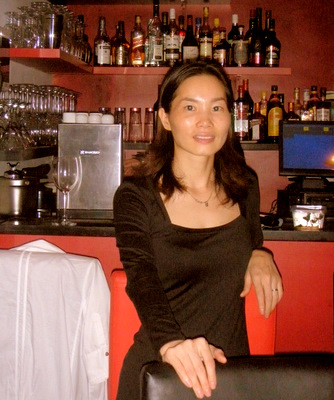
You’re thinking, less than half price, great! Right?
Not so fast. Let’s take a look at how the other half lives.
The “Hong Kong effect” is clearly evident in Shenzhen cuisine, given that they are major cities separated only by a de facto border.
Therefore, upscale Cantonese cuisine a la Hong Kong is one of the most popular fares for companies entertaining prospective clients, and comparable food at the best restaurants on either side of the aforementioned border can easily vary by a price factor of two or three, given that the Shenzhen restaurants can justify the premiums given the cuisine’s “foreign” appeal.
Getting back to the basics, items like bottled water, sodas and snacks are generally around three-quarters of the price one would expect to pay in Hong Kong.
For the beer drinkers out there, if you are willing to go local, the hops are actually cheaper than water.
Selling prices for 750 ml bottles of Tsingtao Beer, or locally-brewed Jinwei, are a mere 2-3 yuan, much cheaper then equivalents in Hong Kong or Singapore.
But don’t book your Shenzhen Spring Break just yet.
At some of the trendier discos in Shenzhen, cover charges can approach a prohibitive 500 yuan, an “entry barrier” seldom seen in Hong Kong and Singapore and guaranteed to ensure you will bump into only sons and daughters of the city’s wealthiest industrialists, trade magnates and well-heeled government officials.
Movie tickets in Shenzhen can actually be higher than in neighboring Hong Kong. Good seats for popular shows in 3D at upscale cinemas like Nan Guo can cost up to 150 yuan, while regular tickets are around 50 yuan.
Getting Around
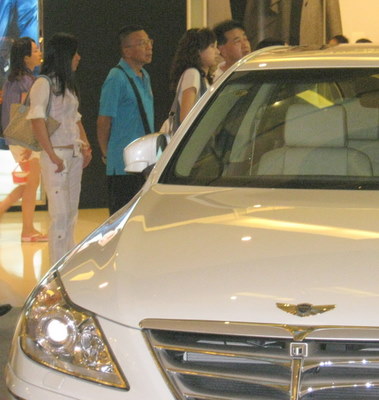
As mentioned above, taxis in Shenzhen are the costliest in China at 13 yuan.
Though most locals prefer cheaper alternatives like subways and busses, travel by taxi for reasonable distances is still quite affordable for most foreigners, especially after the subways shut down at midnight.
The mass transit system is expanding rapidly, and now has full subway connectivity between downtown Shenzhen and Shenzhen Baoan International Airport -- a full 50 km from the city center.
By taxi, the trip will cost over 100 yuan, but subway travel cuts the fare to under 10 yuan.
The bus system is also very affordable and has extensive routes, with fares ranging from 1.5 yuan to 5 yuan. But be warned that English is seldom heard or seen onboard, and be prepared to vie for a coveted seat with all the gusto of a rugby scrummer.
Big Ticket Items
For those who prefer not to jostle for position on the mass transit system, buying a car is always an option.
However, Shenzhen is decidedly years behind Hong Kong and Singapore in terms of opening its arms (and wallets) to imports, hence the latter two “city states” being consistently ranked among the world’s best cities to do business, and having the most open economies.
Import taxes make purchasing non-local vehicles quite prohibitive, and many opt to buy cars in Hong Kong (albeit with steering wheels on the ‘wrong side’) and drive them back across the border to their homes or apartments in Shenzhen.
Personally, I have seldom found the need for a car in Shenzhen as distances are generally manageable and the taxi/subway/bus/walking distances are within most outsiders’ budgets or energy levels.
But for those who insist on spending hours behind a wheel, the cheapest bare-boned models from domestic carmakers like BYD and Chery can actually be had for around 12,000 usd.
Luckily for those in need of white goods, China has been actively promoting domestic consumption to replace the old, sputtering model of over-reliance on exports.
That means domestic manufacturers of refrigerators, air conditioners, microwaves and even big screen TVs are encouraged (sometimes via blatant subsidies) to finally begin taking a serious look at the 1.3 billion strong domestic market.
This translates into intense competition for expedible yuan-based income which means competitive prices for consumers as well as comparable prices for the foreign brands -- which are predominantly Made in China in the first place.
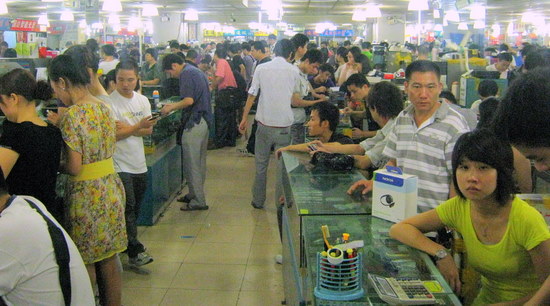
Non-local shoppers will be surprised to find DVD players (remember those?) for under 100 yuan in some shops in the city's sprawling electronics shopping district known as Hua Qiang Bei (translation: "Strong China North").
Non-brand name microwave ovens can be found for under 200 yuan, but most are willing to pay a bit more for an established brand to keep the microwaves inside the oven, so expect to pay around 300-400 yuan for a local model like Haier or Midea, and slightly more for a GE or Samsung.
At the end of the day, I think most people in Shenzhen -- whether from north China or North America -- are willing to tolerate the relatively high prices in this fast-growing city for exactly that reason ... the fast-growth and future potential of this tropical boomtown is simply too enticing to ignore.
What makes this city snuggled against Hong Kong tick?
Since its designation as a Special Economic Zone (SEZ) in 1978 by pioneering state leader Deng Xiaoping, the city has always been somewhat of a social engineering laboratory for the Party.
That Chairman Deng is sometimes referred to as “The Father of Shenzhen” is somewhat representative of this notion despite the city having been around for millennia, with archaeological remains from over 7,000 years ago discovered here in 2006 which was quickly called one of China’s greatest such findings for that year.
Deng is sometimes cited as uttering the exclamation: “To get rich is glorious!” after witnessing firsthand some of the early industrial successes from the flood of Hong Kong capital flowing into Shenzhen’s upstart joint venture enterprises in the late 1970s.
One recent example of how Shenzhen is often joined at the hip with Beijing – via very long puppet strings – is the recent drastic hike in the city’s minimum wage.
Although Shenzhen is no longer called an SEZ, the 20% overnight hike to a minimum wage of 1,320 yuan per month that China’s central government authorized for the city this spring still gives denizens here the feeling that they are part of a grand ongoing national experiment in social betterment.
The government justified the move at the time as an effort to stymie inflation.
Workers could hardly complain, because with the new measure, Shenzhen had for the first time overtaken the country’s financial capital of Shanghai and now boasted the highest “lowest” allowable monthly salary in the country.
But like most things in Shenzhen, the truth is onion-like and only found after peeling off a few surface layers.
See also:
HK Tycoon's Chow Tai Fook Jewellery IPO May Top 30x P/E
VODONE: No.1 Mobile Gamer In China, Shares At 52-Wk Low... What Gives?







